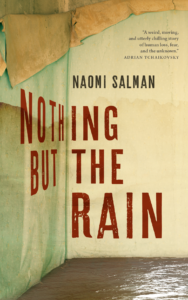
February is always a great month for catching up on stories—especially relatively short ones—from other people’s favorites lists, and while I had heard almost no buzz about Nothing But the Rain by Naomi Salman, a book club friend had it atop their 2023 novella list, so I thought I’d give it a try. Guess what? Now it’s atop my list as well, and I am increasingly confused as to its lack of buzz.
Nothing But the Rain takes place in a small, rainy town in what sounds an awful lot like the Pacific Northwest. At some unknown time in the past, exposure to the rain began stripping memories away from its residents, who must try to find a way to survive in a world where any trip outside threatens their minds. The novella is a short one, coming in at just 93 pages in paperback, and consists of three sections, all of which are written as a series of diary entries by the main character.
With the diary format and memory shenanigans, it’s perhaps no surprise that the first comparison that comes to mind is Susanna Clarke’s stunning short novel Piranesi. Nothing But the Rain trades out Piranesi’s naive wonderment and infinite, magical setting for something more grounded, with a stubborn curmudgeon lead and a little town surrounded by army blockades. But you know what? It works. For all that the stories are tonally very different, there are enough structural similarities that I’m inclined to recommend one to fans of the other.
Because if you’re onboard with the diary format and unreliable memories across the board, this is a story that hooks you quickly and only gets better as it progresses. Part one is a mixture of reports from the elderly lead’s everyday life and dutiful reporting of the things she’s tested—to ensure the information isn’t lost—laying out the background worldbuilding in a way that neatly integrates into the concept.
Of course, the biggest question lurking in the background is the question of why this is all happening, but that question isn’t within the scope of the novella. The lead is a nobody on the world scale, and she’s not going to escape the town and complete an investigation into any outside bad actors in the space of 90 pages. But that doesn’t mean there’s no plot ramping up. The inevitable crisis comes, forcing the lead to venture into the rain, leading to a steady escalation culminating in a true gut-punch of a final section. As I suggested in the introduction, I put this book down and immediately wondered why people hadn’t been shoving it in my face all year.
There were a couple moments that had me thinking for probably longer than I should’ve about the reporting of certain events—either I had visualized a scene in a way that didn’t make sense or where the scene went, or the lead forgot something it seemed she should’ve remembered, or she failed to ask a question that seemed obvious. But there weren’t many of these moments, and they never felt like the sort of thing that invalidates the whole plot; they were just details that could’ve been communicated a hair more clearly. And those were enough for me to pump the brakes on my initial “this is the best thing I read all year” reaction. But it’s easily still the best novella I’ve read in well over a year, and I can’t think of much I’d put against it in the last several years apart from Adrian Tchaikovsky’s excellent Elder Race and Ogres.
In short, I adored Nothing But the Rain. The reader has to be onboard with a novella that limits the scope of the story—with much more the feel of an expanded novelette than a compressed novel—and has to enjoy an unreliable narrator putting the story down in disjointed pieces. But for readers that do, this one starts strong and ends stronger, and as epistolary stories go, it has a reasonably low barrier of entry. If the concept appeals at all, this is a story to make room for.
Recommended if you like: epistolary formats, elderly curmudgeons, weird memory shenanigans.
Can I use it for Bingo? It’s hard mode for 2023 Release, and it’s also a Novella featuring Mundane Jobs.
Overall rating: 18 of Tar Vol’s 20. Five stars on Goodreads.
